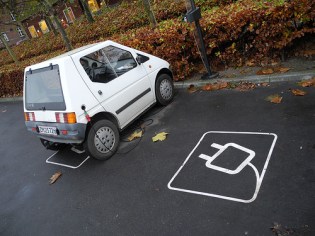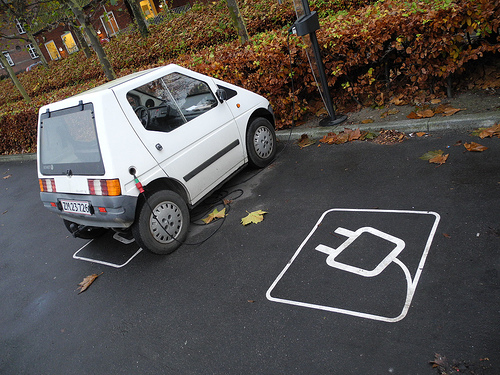
Photo by Michael Edson.
Electric cars are finally picking up speed on American roads after being stalled out for a decade or two. The new cars are zippy, they corner like they’re on rails, and they’re a hell of a lot cheaper to drive than the gas burning kind.
But that last part might change: Several states, including Washington and Arizona, are now considering taxing electric vehicles. And while many electric car drivers seem game, others are concerned that a tax could bomb a nascent industry on the runway, just as it is finally about to take off.
To understand what’s up, it helps to take a short detour through U.S. history. (I promise, it’ll only sting a little.) Back in the early 1900s, the federal and state governments cooked up a smart way to scrape together enough money to build and maintain a road system that remains the envy of the world. They levied a tax on gasoline.
Gas taxes, which now add about 43 cents to the cost of a gallon of gasoline on average, have never covered the full costs of roads or their many unintended consequences. But the idea made a lot of sense: The more you drove, the more you paid. Bigger vehicles, which did more damage to roads, burned more gas, and therefore picked up a bigger chunk of the bill. To top it off, it was super easy to collect: The government just added it to the cost people paid at the pump. Zing.
There’s a problem: This only works if we’re burning fuel with reckless abandon. As soon as people start driving less or driving more fuel-efficient vehicles, the bottom drops out of our masterful tax scheme.
With the economy in the tank, Americans have been burning less gas lately. Partly as a result, we’ve seen highway projects stall across the country — and has anyone else noticed all that the potholes seem to be breeding like gopher dens?
The Federal Highway Administration estimates that just getting “structurally deficient” bridges up to snuff will require more than $70 billion – and that’s just old bridges! With the gas tax shriveling (in 2008 alone, Congress had to inject the highway fund with an extra $8 billion to keep the machinery running), lawmakers are scrambling for other funding streams.
Republicans in the U.S. House of Representatives have infamously proposed that we throw a big bake sale, opening the Gulf of Mexico, the Arctic National Wildlife Refuge, and other areas to oil drilling, and using the proceeds to fund road projects. (The White House, happily, has threatened to veto the proposal if it makes it to the president’s desk.)
State legislatures, meanwhile, are looking for new ways of collecting from folks who aren’t paying their way. Thus the new attention on electric cars: While they’re not burning gas, or paying the gas tax, they’re still pounding the pavement. So while drivers may feel all smug about their decision to give the finger to the oil companies, they may feel less enthusiastic about the fact that they’re screwing over our roads, too.
In Washington state last week, the state Senate passed a bill that would charge electric car owners a $100 annual fee to make up for the lack of gas taxes. A bill in the Arizona House of Representatives would charge electric car drivers up to 1.43 cents per mile. It is based on a proposal that was floated — and sunk — in Oregon’s legislature last year.
Jim Stack, president of the Phoenix chapter of the Electric Auto Association, told Green Car Reports that most electric car owners in Arizona would agree to pay the fee. “Someday it’s all going to be hybrids and electric vehicles,” he said. “It wouldn’t do us any good if we didn’t have any roads.”
But not everyone is so sanguine. “The point is we’re trying to increase the number of nonpolluting vehicles on the road,” John Christian, chair of the Oregon Electric Vehicle Association, told Business Week last spring. He suggested that the state hold off on charging (ahem) electric car owners road fees until clean vehicles make up 25 to 50 percent of the wheels on the street.
Right now, electric cars barely register in the statistics. If President Obama succeeds in his effort to put 1 million electric vehicles on U.S. roads by 2015, they will still represent less than half of one percent. Still, how would we maintain our roads if half of the people banging around on them weren’t paying their way? Electric car proponents have suggested simply raising the gas tax each year to make up the difference, steadily ratcheting down on polluters while creating a growing incentive for people to buy clean cars.
Larger gas taxes have the added benefit of encouraging people to drive less, thereby cleaning up the air, but if the proposals in Washington, Arizona, and Oregon are any indication, we’ll be taxing electric vehicles too, long before every second car whizzing by on the freeway has a battery, not a gas tank, in its belly.



